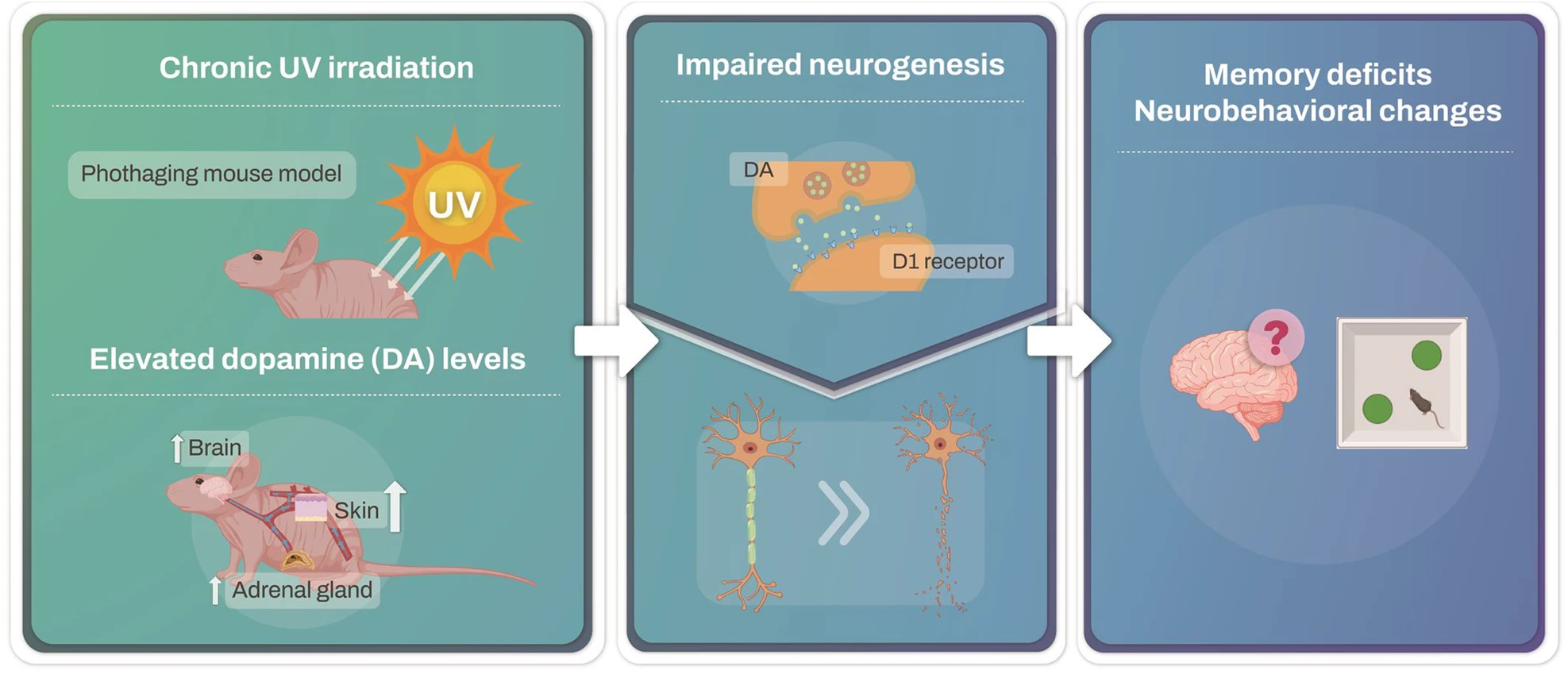It's well known that reduced exposure to sunlight, during winter months, is associated with depression. The skin, upon UV exposure, produces various cytokines and other signaling molecules that can affect brain function. For instance, it can increase the production of serotonin, a neurotransmitter that regulates mood, appetite, and sleep. In a recent article UV exposure is associated (in mice) with deficits in hippocampal memory, synaptic plasticity, and adult neurogenesis, as well as increased dopamine levels in the skin, adrenal glands, and brain. Ironically, previous studies show that moderate UV exposure can increase blood urocanic acid levels and enhance learning and memory in the mouse brain via the glutamate biosynthetic pathway. So as usual in biology, there is no single, linear effect of UV exposure.
Dopamine is instrumental in various brain functions and is commonly linked to feelings of pleasure, reward, motivation, and memory. Sustaining a balanced and regulated level of dopamine signaling in the brain is essential since excessive or dysregulated dopamine signaling can harm mental and physical health. Lack of dopamine production in substancia nigra is believed to be causative of Parkinson's disease.
The article discussed today is a small (tiny?) study on 17 mice (9 control and 8 intervention's arm) in Korea.
 These naked mice allow easy experiments on the skin, application of topical agents, and exposure to UV. To investigate the effects of UV irradiation on hippocampal memory and neurogenesis, mouse skin was irradiated with UV for 6 weeks. After 6 weeks of UV irradiation, the mice underwent behavioral tests. Photoaged mice exhibit impaired cognitive function and neurogenesis.
These naked mice allow easy experiments on the skin, application of topical agents, and exposure to UV. To investigate the effects of UV irradiation on hippocampal memory and neurogenesis, mouse skin was irradiated with UV for 6 weeks. After 6 weeks of UV irradiation, the mice underwent behavioral tests. Photoaged mice exhibit impaired cognitive function and neurogenesis.
The scientists analyzed 28 neuropeptides in mouse serum to elucidate the neurotransmitter-mediated mechanisms underlying these skin–brain interactions. Among these neuropeptides, dopamine was the most significantly upregulated. The dopamine level was ~130–145% greater in the serum of UV-irradiated mice than in that of sham-irradiated mice.
The authors measured dopamine levels in the skin and adrenal glands as serum dopamine levels are influenced by the sympathetic nervous system. Dopamine levels in the skin and adrenal glands were significantly greater in UV-irradiated mice than in control mice.
 In response to UV exposure, no significant changes in dopamine levels were detected in the ventral tegmental area (VTA), substantia nigra (SN), or hippocampus (HPC). However, dopamine levels in the prefrontal cortex (PFC) and hypothalamus (HT) significantly increased.
In response to UV exposure, no significant changes in dopamine levels were detected in the ventral tegmental area (VTA), substantia nigra (SN), or hippocampus (HPC). However, dopamine levels in the prefrontal cortex (PFC) and hypothalamus (HT) significantly increased.
So unfortunately, it seems UV irradiation would not be useful for patients with Parkinson's disease, as no significant changes in dopamine levels were detected in the ventral tegmental area (VTA), substantia nigra. Yet these mice were exposed to high levels of UV, maybe with moderate levels the effect could be beneficial?
Dopamine levels and cognitive function exhibit an inverted U-shaped relationship, suggesting that cognitive performance can be reduced with either deficient or excessive dopamine. In contrast, peak cognitive function is associated with an optimal dopamine level. Insufficient dopamine can lead to difficulty maintaining attention, reduced motivation, and impaired working memory.
Conversely, excessive dopamine can impair cognitive function, inducing challenges in maintaining a stable focus, as noted in conditions such as schizophrenia, where dopamine pathways are hyperactive.
In conclusion, this is a well-done tiny study that may or may not tell something about the human response to high doses of UV. It might be worth investigating if UV exposure might be beneficial in Parkinson's disease.
